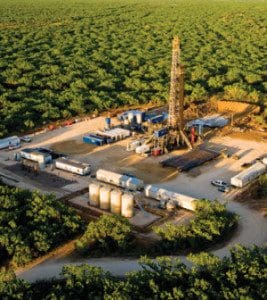In last Thursday’s Wall Street Journal there was a front page article titled U.S. Boom Can Stand Further Fall in Oil Prices. “Oil prices would need to fall at least another $20 a barrel to choke off the U.S. energy boom, industry experts say, though some smaller American producers would face serious problems from a more modest decline.” But that is a debatable number. “OPEC’s secretary general, predicted Wednesday that if current prices hold, half of the U.S. oil that is fracked from shale formations will be uneconomic, leading companies to stop producing it.” Further, a recent report by Goldman Sachs Group, shale oil producers often break even around $80 to $85. U.S. crude closed Wednesday at $82.20 a barrel.
Eagle Ford Oil Well
One point missed here is that the point at which producing oil is uneconomic, in the sense that is not profitable, is not the point where that oil stops being produced. The new shale oil and gas production processes were developed by independent owner operators. The “majors” have been conspicuously late to the game. The independent owner operators focused on shale have spent heavily on securing land rights and are often highly leveraged. Bringing oil online quickly is critical to servicing their debt even if it is not profitable on their Income Statements. It is only when companies have hemorrhaged so much money that they go bankrupt, that production will stop.
In many ways this is a primitive supply chain. Large parts of this value chain are outsourced to well service companies and these companies are poorly integrated into the planning process. Many companies lack personnel with supply chain titles, the supply chain function is under the domain of procurement and supply chain personnel are not well respected by their peers. The operations managers that drill the sites and get them up to full product are mavericks that resist control. And very, very few companies practice integrated business planning.
Even with improved supply chains, containing costs will not be easy: wells decline quickly; shale basins operate over very large areas; and this is a long value chain both in terms planning horizons and lead times.
In the process of doing research in this area – I talked to 45 subject matter experts on this value chain – I came to the conclusion that the single biggest opportunity to improve cash flows in this value chain will be based on implementing a form of integrated business planning specific to shale oil & gas. Oracle and Accenture have teamed up to create a solution set for shale oil & gas focused on doing better integrated business planning. Oracle will focus on software, Accenture on change management and implementation.
Most integrated business planning has focused on product centric supply chain industries. Shale oil & gas is a project centric value chain. However, if one understands the core concepts of sales & operational planning, adjusting that process to project centric industries like shale oil & gas is not that difficult from a process or technology perspective. Overcoming the cultural hurdles, however, will be very difficult.
I believe that shale oil & gas is one of three industries going through massive supply chain transformations. Of the three, shale oil has the furthest to go, but the continued existence of many companies in this industry may depend upon how quickly and successfully they embrace value chain best practices.



















Leave a Reply